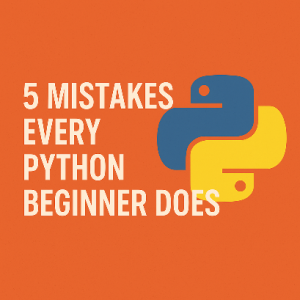5 Mistakes Every Python Beginner Does
Python is one of the most beginner-friendly programming languages out there, but that doesn’t mean it’s foolproof. As a beginner, you’re bound to make a few mistakes—don’t worry, that’s how we learn! In this blog post, let’s look at the top 5 common mistakes every Python beginner makes, and how to avoid them.
Misunderstanding Variable Assignment and Mutability
Python variables don’t store the actual data—they reference objects. This becomes a big deal when dealing with mutable data types like lists or dictionaries.
❌ Mistake:
list1 = [1, 2, 3]
list2 = list1
list2.append(4)
print(list1)
# Output: [1, 2, 3, 4]
The beginner expected list1 to remain unchanged.
✅ Fix:
list2 = list1.copy()
Tip: Understand the difference between mutable and immutable types, and use
.copy()orcopy.deepcopy()when needed.
Using == Instead of is (or Vice Versa)
== checks value equality, while is checks identity (same memory location).
❌ Mistake:
a = [1, 2]
b = [1, 2]
print(a is b) # False
✅ Fix:
print(a == b) # True
Tip: Use
==to compare values. Useisonly to check if two variables point to the same object.
Ignoring Indentation Rules
Python relies heavily on indentation to define blocks of code. A single wrong space or tab can cause errors or change logic.
❌ Mistake:
if True:
print("This will cause an IndentationError")
✅ Fix:
if True:
print("Correct indentation")
Tip: Stick to either spaces or tabs, never mix them. Use 4 spaces per indent level (Python standard).
Overcomplicating Simple Tasks
Beginners often write too much code for something Python already does simply.
❌ Mistake:
words = ['apple', 'banana', 'cherry']
for i in range(len(words)):
print(words[i])
✅ Fix:
for word in words:
print(word)
Tip: Learn Pythonic ways to do things. Read the Zen of Python:
import this
Not Using Virtual Environments
Installing all packages globally leads to conflicts later, especially when working on multiple projects.
❌ Mistake:
pip install flask # installs globally
✅ Fix:
python -m venv myenv
source myenv/bin/activate # or myenv\Scripts\activate on Windows
pip install flask
Tip: Always use a virtual environment for each Python project to manage dependencies safely.
Final Thoughts
Mistakes are part of learning any language, and Python is no exception. The key is to recognize these patterns early and correct them as you grow.
If you’re just starting your Python journey, remember:
- Practice regularly.
- Read other people’s code.
- Don’t fear errors—they’re your best teachers.
Let us know in the comments if you’ve made any of these mistakes—or discovered new ones. Happy coding! 🐍






